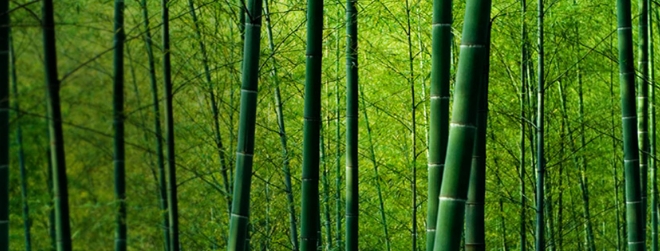
Although it is relatively new to the textile industry, bamboo is taking it by force.
Where once cotton reigned as king, bamboo clothing is plotting its coup. Bamboo fiber is popping up in everything from panties to t-shirts to bed linens and towels.
Bamboo has many of the same characteristics of cotton, but with added versatility.
For instance, unlike many other fabrics, bamboo has the ability to mimic the drape and texture of silk and cashmere.
Therefore, bamboo has recently become a favorite of such designers as Kate O'connor, Sara Kirsner of Doie, and Carol Young because of its luxurious and resilient qualities.
Characteristics of Bamboo Fabrics
- Bamboo fabrics are antimicrobial, antifungal and antibacterial.
- Breathable
- Resilient
- Biodegradable
- Highly absorbent
- Wrinkle resistant
- Absorbs dyes better than cotton
- Excellent drape
- Luxurious
- Easy to care
- Thermal regulating
Bamboo and the Environment
Bamboo is sustainable, renewable and very environmentally friendly, growing bamboo requires no pesticides or fertilizers--making it a healthier alternative to conventionally grown cotton for the planet and for the farmers who grow and harvest it.
In addition, bamboo has an incredible life cycle.
Within 3 to 5 years, bamboo is harvestable and ready for manufacturing into clothing, paper products, and building materials--far less time than their woody counterparts, trees! Bamboo's sustainability is also evidenced in its ability to self-regenerate.
No replanting is required of this incredible "grass."
Drawbacks to Bamboo Clothing
Please keep in mind; unfortunately, while bamboo is very environmentally friendly to grow, the process of manufacturing bamboo fibers into fabrics is not so eco-friendly.
The chemical processes required to prepare bamboo for spinning into yarns is harmful both to the environment and to people.
Bamboo leaves and shoots are soaked in a lye and carbon disulfide bath--both of which are toxic.
Therefore, very little bamboo clothing or fabric can be considered eco-friendly.
However, there are processes to manufacture bamboo fibers into fabric without harmful chemicals.
Unfortunately, they are labor and time intensive, making bamboo fabrics processed in this way very expensive.
On a good note--as demand for eco-friendly bamboo fabrics increase, most likely stricter regulations for chemical usage in the manufacturing processes of bamboo will be required, hopefully making bamboo clothing a more eco-friendly and socially responsible choice. As you consider buying bamboo clothing, try to look for eco-friendly certifications like Oeko-Tex or SKAL.
These certifications help ensure the clothing you wear are eco-friendly from the beginning to the end of the manufacturing processes.
You May Also Like
No posts were found for display
